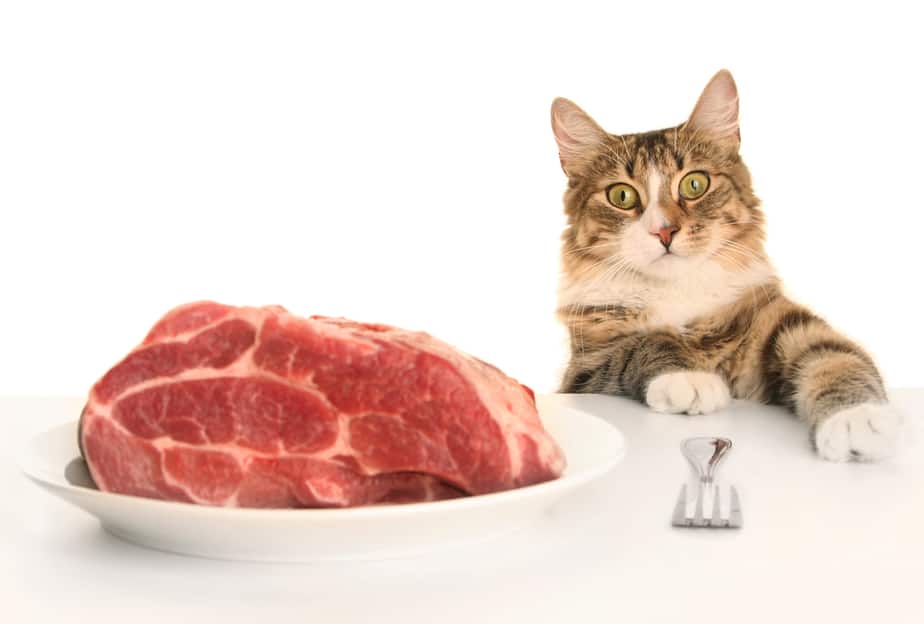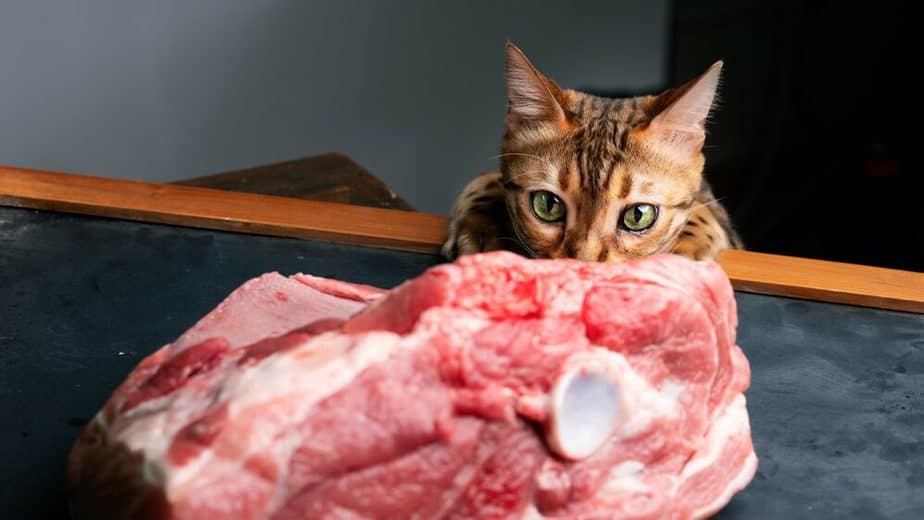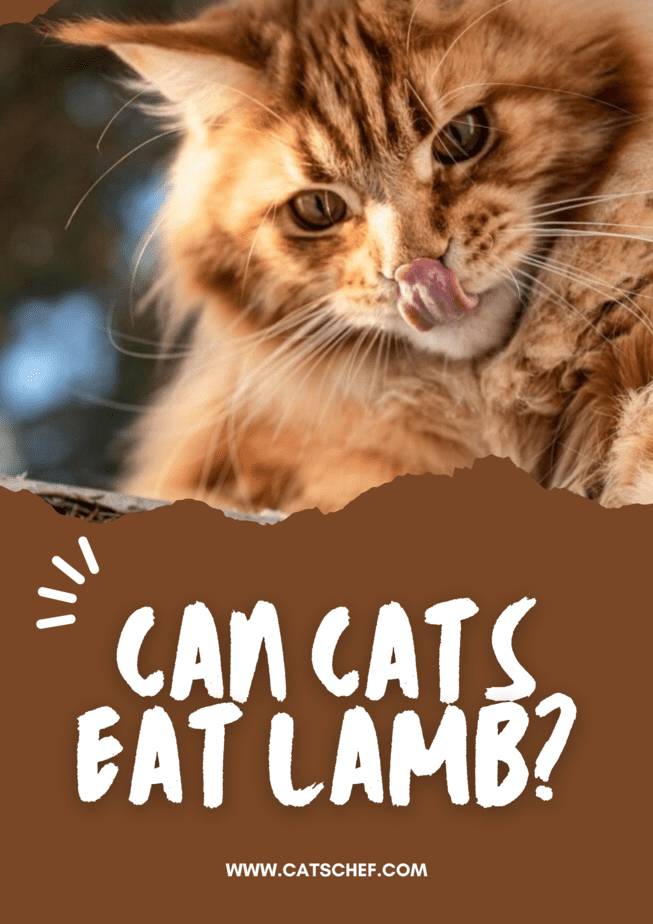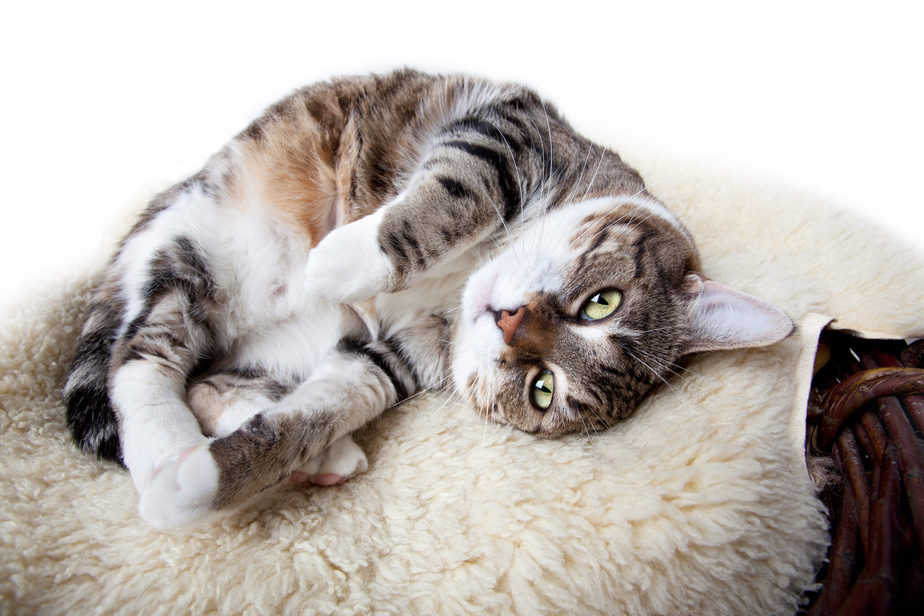‘Kibble just isn’t doing it for my cat! She loves eating meat so I feed her beef, turkey, and chicken all the time. But, what about lamb? Can cats eat lamb?’
We all know that cats are obligate carnivores. They need lots of animal protein and fat to stay healthy.
Most pet parents are happy to feed their feline friend kibble and other commercial cat food. After all, it’s designed to fit your cat’s nutritional needs.
However, your fussy friend might not be happy with a diet consisting of mostly kibble and an occasional portion of chicken and gravy cat food. Cats are curious creatures and they love nibbling everything that meets their eye. If your cat sees you eating lamb chops, chances are she’s going to want to take a bite.
So, can cats eat lamb? Yes, they can. Lamb is perfectly safe for your feline friend and you shouldn’t be worried if she steals a bite or two.
Can cats eat lamb?
Cats are able to consume fresh meat on a regular basis. Lamb is one of the best options for your cat as it isn’t as allergenic as some other meats (beef or seafood).
However, you should be careful with the amount of lamb your cat consumes. This type of meat can be fatty and tough on her belly, so it’s best to enjoy it less often and in moderation. If you’re looking for more information on some nutritional risks and benefits, keep on reading.
Risks

Firstly, lamb may not be an appropriate choice for all cats, and you should always consult with your vet before making any changes to your cat’s regular diet. Even though lamb allergies aren’t common, it’s better to be safe than sorry.
Secondly, lamb meat and skin are rich in saturated fats. If your cat eats too much lamb she might be exposed to the risks of high cholesterol, clogged arteries, and heart disease. High levels of saturated fats are also linked to feline cancer, so it’s safe to say you should avoid feeding your cat too much lamb.
Thirdly, you should never feed your furry companion lamb bones. Your cat might be interested in munching on them, but cooked bones pose a serious risk of choking or even intestinal obstruction. If you decide to share some lamb with your cat, make sure to remove any skin and bones.
Lastly, your trusty sidekick won’t appreciate any seasoning on those lamb chops. Too much salt, onion, or garlic may lead to significant digestive issues followed by vomiting, diarrhea, and lethargy.
Benefits
Lamb is packed with protein which makes it an excellent meal for your cat. Unlike dogs, cats are carnivores which means they need protein to survive because they use it for energy. Lamb is also rich in amino acids which are responsible for building muscles.
It is packed with riboflavin, niacin, and vitamin B12. Riboflavin helps break down fat cells, but also makes your cat’s fur shinier and healthier. Lack of riboflavin causes alopecia, so it’s safe to say you should buy some extra lamb next time you go to the farmer’s market.
Vitamin B12 is crucial to your cat’s immune system, nervous system, and digestive tract. If your feline friend doesn’t get enough of this vitamin, she might experience signs of weight loss, lethargy, vomiting, and diarrhea. An occasional lamb chop might help bring those levels a bit higher!
Lastly, introducing lamb to your cat’s regular diet might help her stay more active and energetic, boost her immune system and improve her overall health. Make sure to consult with your vet before making any changes to your cat’s diet.

Can cats eat raw lamb?
No, cats can’t eat raw lamb. There are many different opinions when it comes to feeding your cat raw meat, but you have to be aware of bacteria and parasites that can only be killed by exposure to high temperatures.
Cats aren’t immune to foodborne illnesses. Raw lamb is often contaminated with pathogens like e.coli and salmonella which can cause serious health issues. The only way to get rid of them is by cooking your lamb thoroughly.
It’s important to mention that you should avoid seasonings and condiments when preparing lamb for your furry friend. Your cat’s digestive system is sensitive to salt, onion, garlic, and many other herbs and spices. It’s best to avoid them altogether.
Can cats eat lamb liver?
Cats can eat lamb liver, but you should avoid adding it to your cat’s regular diet. This organ is very rich in vitamin A, which is great in small doses; but can easily become toxic to your cat if you’re not careful. Too much liver can lead to a condition called Hypervitaminosis A.
Hypervitaminosis A is a painful arthritic condition that causes your cat’s vertebrae to fuse together. Not only that, lamb liver can be extremely addictive to cats, and you may have a hard time trying to get your cat to eat anything else.
It’s better to stay on the safe side and avoid feeding your cat lamb liver. There are better alternatives on the market, and you can always opt for freshly cooked lamb meat.
To conclude
Cats can eat lamb! If you’re looking to enrich your cat’s diet with some fresh meat, lamb might be a great choice for you. It’s delicious, nutritious, and packed with some good-quality animal protein. As long as you don’t overdo it, your cat should be able to enjoy an occasional lamb feast.
Make sure to avoid feeding your cat skin, bones, lamb liver, or raw lamb. You should cook this meat properly without salt, onion, garlic, or any other seasonings. Your feline friend prefers simplistic cuisine! All jokes aside, cats are prone to digestive issues so it’s better to avoid any harmful ingredients.
If you want to be on the safe side, you can always opt for canned cat food that’s made by your feline’s preferences. Brands like Instinct have some great options that are great for your pet’s health.
However, if you have a chubby kitty at home, you might want to avoid lamb altogether. It’s quite fatty and caloric, and might not be the best choice for her. If she won’t stop staring at you while you’re eating, a nibble or two won’t do her any harm.
Lastly, always contact your vet before making any changes to your cat’s diet. All these different kinds of meats are great for introducing some variety to your feline friend’s meals, but you can never be too careful.
If your cat can’t eat lamb, there are some great alternatives on the market. Don’t be sad, kitty!
Read more: Can Cats Eat Venison? Deer To Be Different?

